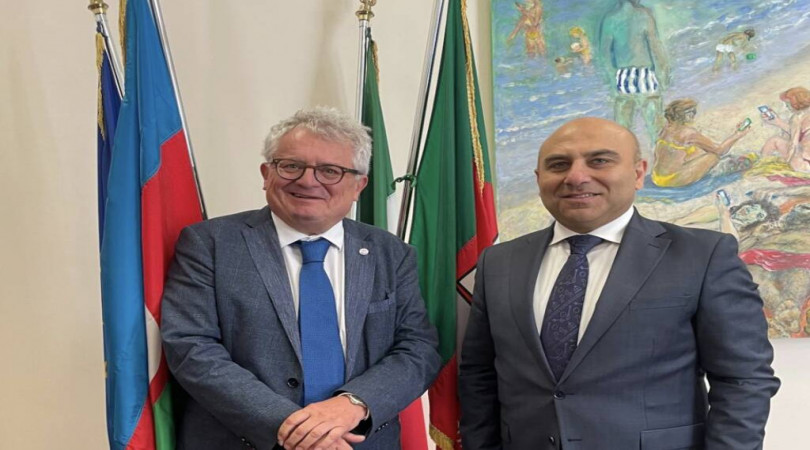Italian newspaper: Unfortunately there are those who incite Armenian nationalism and revanchism in Europe
The Italian Deputy Foreign Minister, Edmondo Cirielli, gave an interview to 'Formiche', one of his country's leading media outlets, on the ongoing processes in the South Caucasus.
Russia is behind the destabilisation between Armenia and Azerbaijan. Cirielli speaks
Interview with the Deputy Foreign Minister: "This affair is the foundation of our international posture: I recall that we are helping Ukraine militarily, which is in a situation exactly mirroring this one. Rome has always been at the forefront in condemning the Armenian genocide by the Ottoman Turks, but the Azerbaijanis have nothing to do with those events".
The ongoing affair between Azerbaijan and Armenia, the deputy foreign minister with responsibility for the Caucasus, Edmondo Cirielli, explains to Formiche.net, is the foundation of our international posture: "We are militarily helping Ukraine, which is in a situation exactly mirroring this one. Rome has always been in the forefront in condemning the Armenian genocide by the Ottoman Turks, but the Azerbaijanis have nothing to do with those events'. And after the recent International Court ruling that reconfirmed Azerbaijan's territorial integrity over Garabagh, it is time for the international narrative of the dispute to change as well. "For the Azerbaijanis, international law has been blatantly violated by the war of aggression waged by Armenia".
On the day when diplomatic talks between Azerbaijan and Armenia resumed, M5S MEP Fabio Massimo Castaldo initiated a letter sent to the President of the European Commission, High Representative Josep Borrell, and the President of the European Council, Charles Michel, calling for 'the prevention of a humanitarian catastrophe and the guarantee of Armenia's security and prosperity in the South Caucasus region'. How to comment on it?
I believe that this action is untimely and risks damaging the peace agreements that have been in place up to now; it is the worst way of operating and meddling in events about which little is known, either in terms of history or from the point of view of international relations. Europe and Italy in particular must work to create a climate of détente between the two sides. I consider the Armenian Prime Minister certainly the most enlightened in recent years and the first to recognize the territorial integrity of Azerbaijan, something that has certainly been affirmed several times by the United Nations in various resolutions. But none of the previous pro-Russian Armenian governments had ever considered this assessment.
Baku had repeatedly called for a peaceful solution?
It must be said that even Azerbaijani President Ilham Aliyev has sought a peaceful solution to the issue over the past three years, after the last conflict that had essentially seen Azerbaijani troops victorious in the field. Unfortunately, there have also been those in Europe who have always fuelled revanchism and Armenian nationalism, deluding Yerevan about things that were then objectively not even provided for in international law.
So is it possible to rule out the possibility of an Azerbaijani attack, as Castaldo's letter suggests?
There is no evaluation, neither political nor military, that could suggest such an idea, it is just madness. Azerbaijan has never taken any action against Armenian territory, this is also a well-known fact, witnessed by independent UN commissions. Nothing has been done by Azerbaijani troops to provoke the exodus, which did indeed take place, but by secessionists who gave vent to reprisals fuelled by pro-Russians who are very strong in the area. With this exodus, they wanted to create an additional reason for tension.
How does pressure from external big players fit in? Armenia, after years of proximity to Russia, seems to want to look to the West now.
Let me preface this by saying that Aliyev has categorically ruled out any Azerbaijani initiative against international treaties. He is a very pragmatic person and certainly knows very well that an attack on Armenia would not only be a foolish act, without any strategic military interest, but moreover contrary to the posture that paradoxically Azerbaijan has always had over the past thirty years in which Armenia has occupied not only Garabagh but also two buffer zones larger than Garabagh itself, inhabited first by Azerbaijanis who were then excluded from those lands. Nevertheless, for thirty years Azerbaijan has always tried to assert all its positions before international courts in multilateral fora. This occupation was exercised by Armenia under the protection of the Red Army. On the other hand, let us not forget that Armenian Prime Minister Pashinyan was elected both times with a clear polemic against Russia, and this is a passage that makes us look positively at the Armenian people's sense of institutions and desire to do good. The real issue is that there is still a very nationalist ruling class and there are circles outside Armenia that aim to destabilize the Caucasus: namely Russia. But that is not all.
Which is?
There are also the powerful Armenian communities living outside Armenia that may not really be aware of the problems and the current state of affairs, and they are also wandering for humanly understandable reasons, because they are children and descendants of the Armenian diaspora, but with a very nationalist and chauvinist outlook. I recall that Italy has always been at the forefront in condemning the Armenian genocide by the Ottoman Turks, but Azerbaijanis had nothing to do with the genocide and cannot pay the guilt of others just because they are Muslims. Moreover, we know very well that Azerbaijan is one of the most secular and tolerant countries in the Muslim world: it is a distinctive trait of theirs. So let us strive not to use religion as an element of conflict between peoples.
On 17 November last, the International Court of Justice reconfirmed Azerbaijan's territorial integrity over Garabagh: is this a good starting point, in the wake of international law, to start talking differently about this issue?
This issue is the foundation of our international posture: I recall that the Meloni government is militarily aiding Ukraine, which is in a situation exactly mirroring this one. Russia waged a war against Ukraine under the pretext of protecting the Russians who, according to them, were being discriminated against by the Ukrainian government. The war between Armenia and Azerbaijan broke out because Armenia, with the support of the Red Army, conquered Garabagh, Azerbaijani territory, as well as two buffer zones inhabited only by Azerbaijanis. So how can we support the Armenian cause when we then support the Ukrainian cause? We certainly could not do so and it would be serious if it depended on a purely religious fact. There is sympathy for the Armenians, for the shame they have suffered throughout their history, but for which the Azerbaijanis bear no responsibility.
What is Italy's position?
We have always clearly condemned the Armenian genocide, both as a party and also personally, along with everything that happened to the Armenians but, I repeat, that for the Azerbaijanis, international law was blatantly violated by the 30-year war of aggression waged by Armenia. Indirectly, Armenia has also recognized this, because it could have resolved the tensions differently and more favorably. Instead, this obtuseness of the old pro-Russian Armenian governments produced an attitude of absolute closure against international relations, but also against Azerbaijan's attempts to resolve this affair on the basis of UN resolutions. Today the affair has been resolved militarily, and I believe that any other state would perhaps not have waited thirty years to resolve an armed occupation: imagine if we in South Tyrol had had an armed occupation by self-styled South Tyrolean separatists with the support of the army, volunteers, or rather the Austrian army. I don't think it would have lasted 30 years. We are a democratic and peaceful nation that repudiates war.
What is Italy's diplomatic role in that macro area?
I am convinced that Italy can play an important role in this. But if you continue to portray the Azerbaijanis as those who used force against the Armenians, you will not help peace. The best way is to start a season of détente, as Georgia has been doing for some time: despite being a Christian country, it is at the same time a privileged partner for Azerbaijan, and like Italy it has a role of great mediation capacity, because it has always defended Azerbaijan's legal and international arguments. It seems strange that precisely Italy, which is a champion of international legality and UN principles, should not support this line.
https://formiche.net/2023/12/armenia-azerbaigian-russia-cirielli/
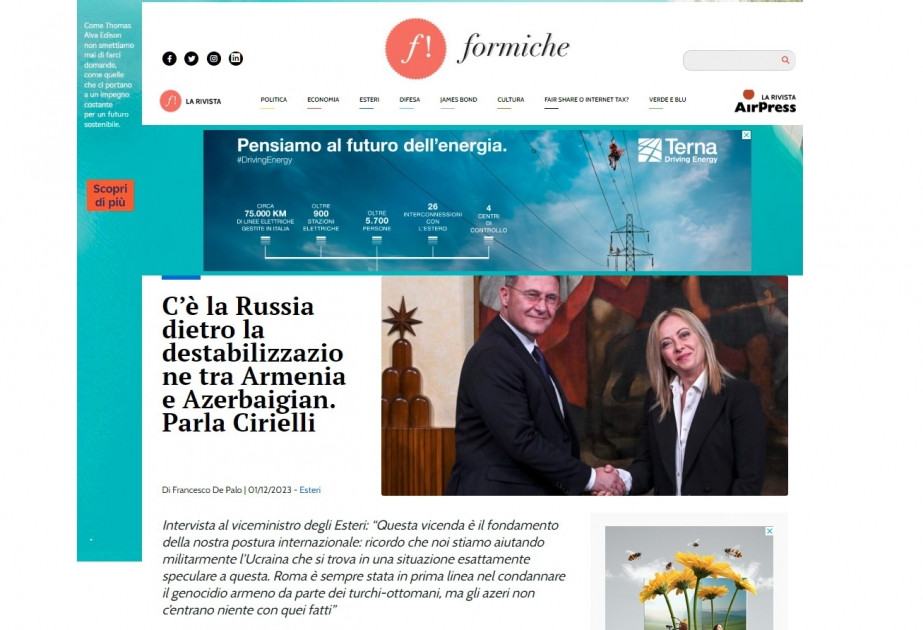

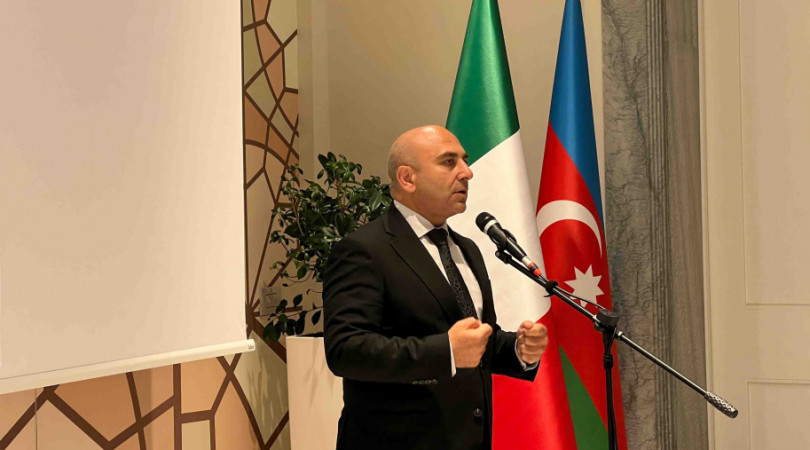
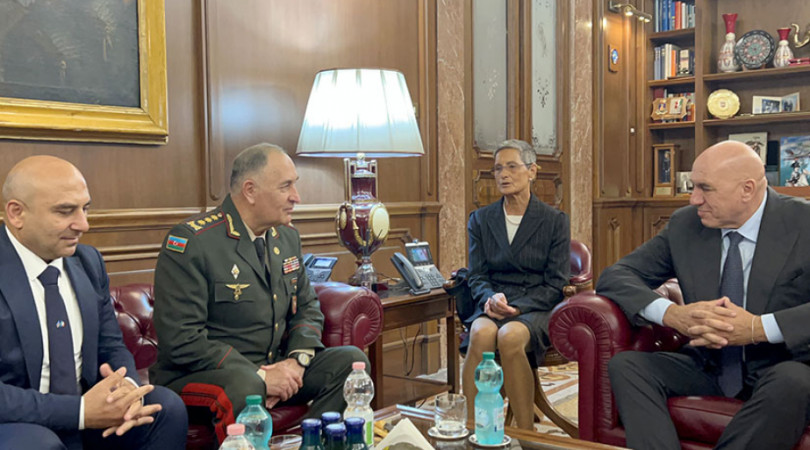
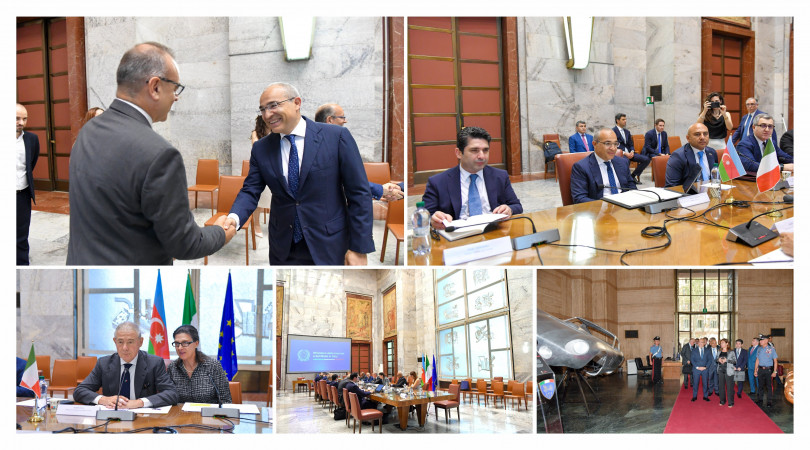
.jpeg)
